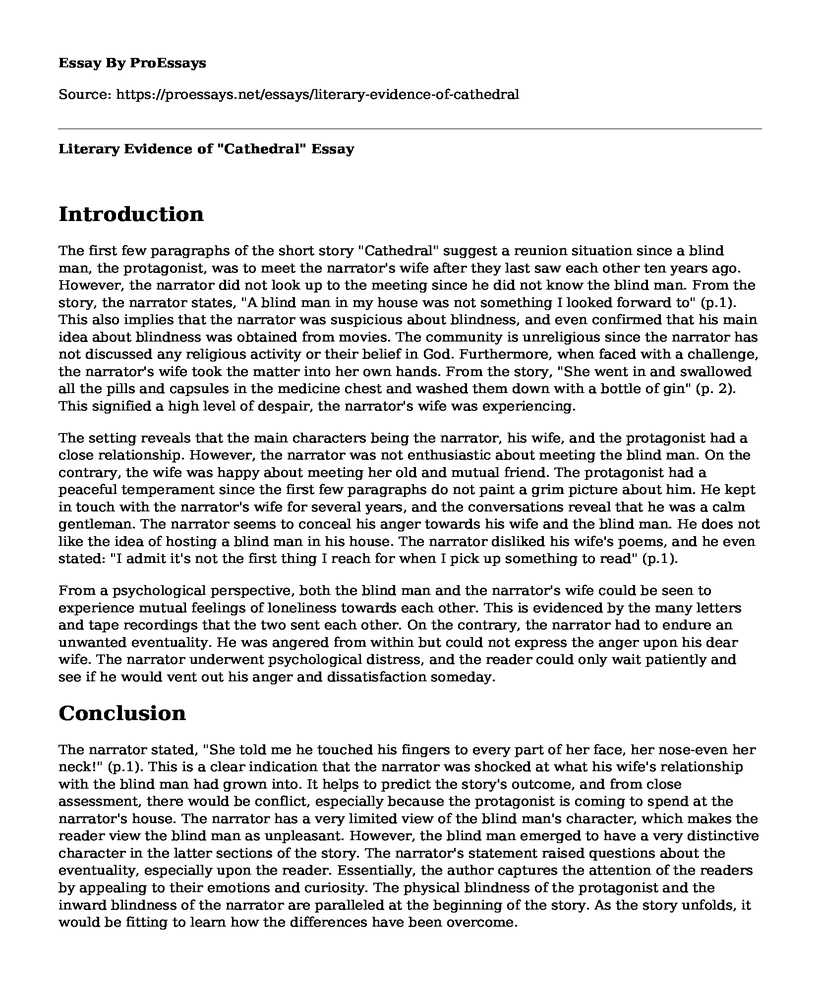Introduction
The first few paragraphs of the short story "Cathedral" suggest a reunion situation since a blind man, the protagonist, was to meet the narrator's wife after they last saw each other ten years ago. However, the narrator did not look up to the meeting since he did not know the blind man. From the story, the narrator states, "A blind man in my house was not something I looked forward to" (p.1). This also implies that the narrator was suspicious about blindness, and even confirmed that his main idea about blindness was obtained from movies. The community is unreligious since the narrator has not discussed any religious activity or their belief in God. Furthermore, when faced with a challenge, the narrator's wife took the matter into her own hands. From the story, "She went in and swallowed all the pills and capsules in the medicine chest and washed them down with a bottle of gin" (p. 2). This signified a high level of despair, the narrator's wife was experiencing.
The setting reveals that the main characters being the narrator, his wife, and the protagonist had a close relationship. However, the narrator was not enthusiastic about meeting the blind man. On the contrary, the wife was happy about meeting her old and mutual friend. The protagonist had a peaceful temperament since the first few paragraphs do not paint a grim picture about him. He kept in touch with the narrator's wife for several years, and the conversations reveal that he was a calm gentleman. The narrator seems to conceal his anger towards his wife and the blind man. He does not like the idea of hosting a blind man in his house. The narrator disliked his wife's poems, and he even stated: "I admit it's not the first thing I reach for when I pick up something to read" (p.1).
From a psychological perspective, both the blind man and the narrator's wife could be seen to experience mutual feelings of loneliness towards each other. This is evidenced by the many letters and tape recordings that the two sent each other. On the contrary, the narrator had to endure an unwanted eventuality. He was angered from within but could not express the anger upon his dear wife. The narrator underwent psychological distress, and the reader could only wait patiently and see if he would vent out his anger and dissatisfaction someday.
Conclusion
The narrator stated, "She told me he touched his fingers to every part of her face, her nose-even her neck!" (p.1). This is a clear indication that the narrator was shocked at what his wife's relationship with the blind man had grown into. It helps to predict the story's outcome, and from close assessment, there would be conflict, especially because the protagonist is coming to spend at the narrator's house. The narrator has a very limited view of the blind man's character, which makes the reader view the blind man as unpleasant. However, the blind man emerged to have a very distinctive character in the latter sections of the story. The narrator's statement raised questions about the eventuality, especially upon the reader. Essentially, the author captures the attention of the readers by appealing to their emotions and curiosity. The physical blindness of the protagonist and the inward blindness of the narrator are paralleled at the beginning of the story. As the story unfolds, it would be fitting to learn how the differences have been overcome.
Cite this page
Literary Evidence of "Cathedral". (2022, Nov 17). Retrieved from https://proessays.net/essays/literary-evidence-of-cathedral
If you are the original author of this essay and no longer wish to have it published on the ProEssays website, please click below to request its removal:
- The Pit and the Pendulum by Edgar Poe - Analysis Essay Sample
- The Spanish Caribbean Literature and Culture: Essay Sample
- Persuasive Essay on Let the Great World Spin Essay
- Change, Alienation, and Isolation in "The Metamorphosis" by Franz Kafka Essay
- Essay on I Hear America Singing: Comparing Walt Whitman and Langston Hughes
- Essay Example on The Color of Water: Racism, Comfort, & Symbols
- Essay Sample on Oedipus: Blindly Making Decisions Through Pride & Fate







